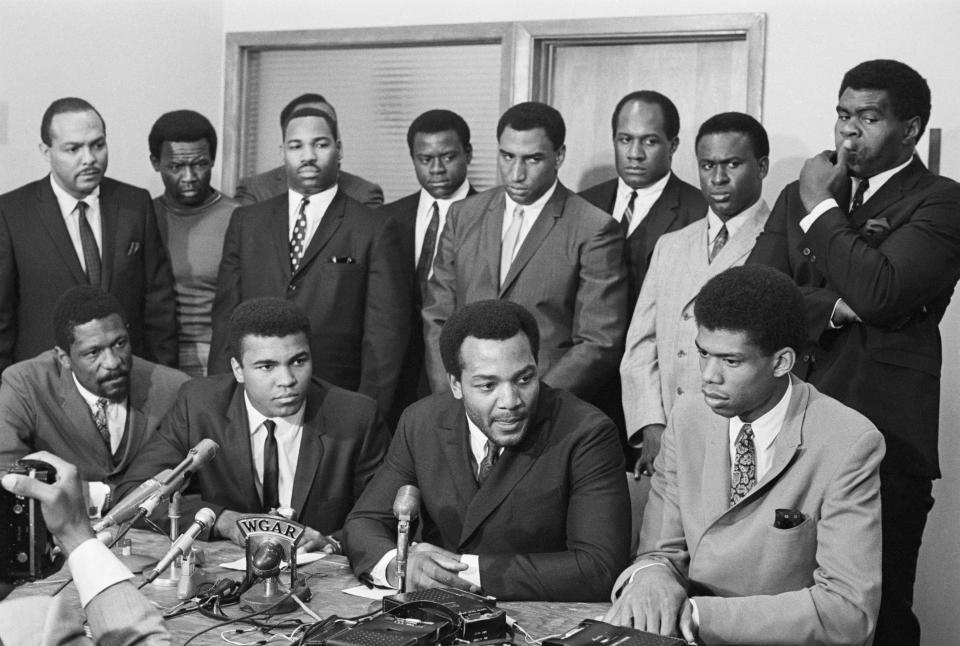Black athletes can look to the 1967 Cleveland Summit and create one for the 21st century
Fifty-three years ago this week, a small group of some of the most prominent black male athletes in America gathered in an office building in Cleveland, Ohio, an event now known as the Cleveland Summit.
As we have so thankfully arrived at a moment when athletes have recognized the power of their voices and the forces they can be for good, it’s time to take the next step and join together for a 21st century version of that summit.
The topic, sadly, won’t be much different than it was on June 4, 1967 — essentially, the fight for equality for black Americans.
But if anything over the last 12 days or so has given me hope that this time things might be different, that we may see actual, tangible work done to topple the racist structures this country continues to balance upon, it is seeing men and women from so many sports speaking out, acting out, and showing what some of us have known for years: they are so much more than statistics on a web page or medals in a history book.

The truth is, the Cleveland Summit’s initial goal wasn’t to present a united front: in a 2017 story by author Jonathan Eig posted to The Undefeated, Eig writes that the men got together to decide whether or not to support Muhammad Ali and his refusal to serve in the Vietnam War.
But it wasn’t as cut-and-dry as some military veterans disagreeing with Ali and others being in favor of his stance. At the time, a lawyer who worked with boxing promoter Bob Arum had negotiated a deal with the government: if he traveled the country doing exhibitions on bases, the charges of him being a draft-dodger would be dropped.
Arum also ran a company called Main Bout, which controlled the closed-circuit television rights to Ali’s fights. Three of Arum’s partners in the venture were recently retired Browns running back Jim Brown and two Nation of Islam leaders. So those four men wanted to see Ali take the deal because it would be financially lucrative for them, and they offered a cut of the pie to athletes who also helped convince Ali.
During the summit, Ali took all manner of questions from his contemporaries, but he never wavered, and he didn’t take the government’s deal. He was exiled from boxing for three years and was one of the most reviled men in the country.
By the end of the day, though, the men did all support Ali because he was so firm in his convictions. Instead of making money from televised bouts, some may have lost money or fans because they recognized that the government was likely singling out an outspoken black man for his stance on the war.
Of course now there’s no threat of a young star athlete being drafted to fight in a war the way Ali was, but the positive that came from that summit — the united front of black athletes speaking out on civil rights — could continue pushing the revolution forward.
There’s even the perfect backdrop for it: LeBron James’ I Promise School in Akron, Ohio, arguably the grandest tangible reminder that these athletes aren’t just talking.
James has been using his voice more and more in recent years, for those who look like him and come from the same impoverished background he does. This week, after Fox News host Laura Ingraham said New Orleans Saints quarterback Drew Brees “is allowed to have his view”, a stark contrast to a couple of years ago when she told James to “shut up and dribble,” James pledged that he “won’t stop until I see CHANGE!!!” and on Instagram wrote, “I’m louder than EVER” under a video.
James has more than enough cache (witness the bold names who agree to appear in his “The Shop: Uninterrupted” show on HBO) to get any and all manner of athletes to Akron.
Picture it: Kareem Abdul-Jabbar and Bill Russell, who were at the ‘67 summit, with icons Tommy Smith and Dr. John Carlos, alongside James, Serena Williams, Colin Kaepernick, Simone Biles, Stephen Curry, Eric Reid, Allyson Felix, Noah Lyles ... the list can go on.
All of them sharing their experiences, highlighting over and over how their athletic excellence and resulting financial gains haven’t shielded them from racism, even within their own sports, what they’ve done and what needs to happen in the future.
Retired NBA champion Stephen Jackson was close friends with George Floyd, the Minneapolis resident whose death set off the current wave of action, and knows better than anyone that police brutality doesn’t end with the victim under an officer’s knee.
WNBA star Maya Moore has taken time away from the game at the peak of her career in large part to lead the fight for justice for Jonathan Irons, a family friend who appears to have been wrongfully imprisoned for decades.
Kaepernick’s peaceful kneeling sought to shed light on extrajudicial killings just like Floyd’s, but the NFL made him into a pariah and has refused to employ him.
The Milwaukee Bucks’ Sterling Brown, the Houston Rockets’ Thabo Sefolosha and former world top-10 tennis player James Blake have all been victims of excessive force at the hands of officers.
NFL defensive lineman Brandon Mebane said he and other black teammates were denied rental housing when the Chargers moved to Los Angeles.
Serena and sister Venus Williams have endured racism in tennis throughout their careers, particularly Serena.
From all manner of the sporting spectrum, there are men and women with stories of how they’ve been mistreated, stereotyped, marginalized or worse.
Instead of separate Instagram posts or tweets, imagine if so many came together in solidarity to speak their truths as black Americans. To educate. To inform. To demand structural change.
They have the power and the platform.
More from Yahoo Sports:


